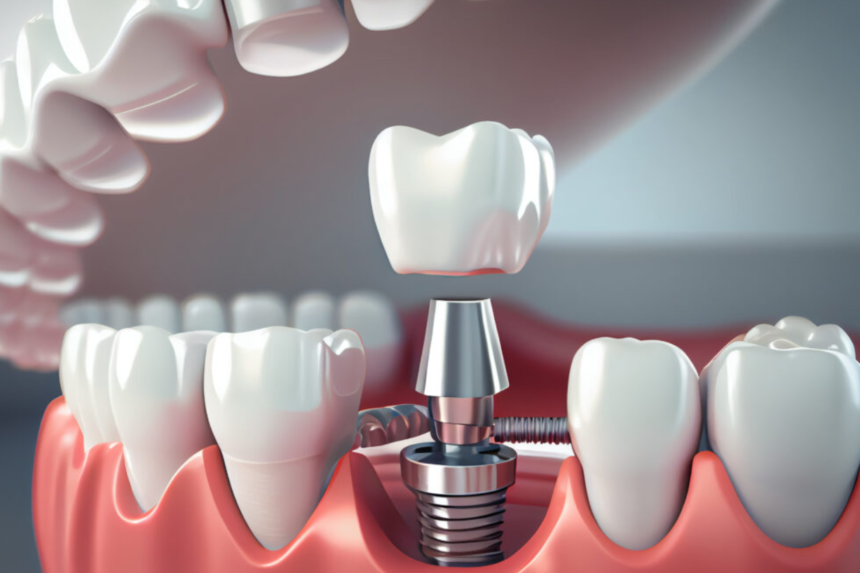Are you in search of the ideal smile? Dental implants present an excellent option for those with missing or damaged teeth. However, post-procedural care and attention are paramount for their longevity and success. Diligent maintenance of your dental implants is crucial to ensure they endure for years to come. Neglecting proper aftercare may lead to complications and jeopardize their efficacy. Dental implants may be fitted for various reasons such as an awkward bite, to replace dentures, for a missing tooth to preserve your bones and gums, and for a smooth alignment and positioning of your teeth. If you treat the implants like your natural teeth, it will be worth the investment. Here are some helpful aftercare tips for your dental implants.
What are Dental Implants?
Dental implants offer a remarkable solution for restoring missing teeth, not only revitalizing your smile but also enhancing your overall oral health. Crafted from titanium, these implants are meticulously positioned into the jawbone, gradually integrating with the bone structure over time. This establishes a robust base for anchoring dental prosthetics like dentures, crowns, or bridges. Additionally, implants can provide support for implant-supported dentures. According to dentalimplantclinicdublin.ie, proper care is essential for the longevity of dental implants. There are four primary types of dental implants: zygomatic, endosteal, transosteal, and subperiosteal.
Aftercare Tips
- Practice Consistent Oral Hygiene Care
Oral hygiene is not only essential for your natural teeth and gums, but it also plays a crucial role in maintaining the health of your dental implants. Follow a consistent hygiene oral care routine to help prevent the buildup of bacteria around the implants, which can lead to potential complications and infections.
Brush your teeth: you must brush your teeth twice a day in the morning and before bedtime. Use a soft bristle toothbrush and fluoride toothpaste. There are toothbrushes specially designed for cleaning dental implants, which could be more effective for cleaning around the implant without the cause of damage.
Floss your teeth regularly: flossing daily is so important in helping remove food particles and plaque from between the teeth and around the implants. Using an interdental brush or water flosser can also help with the process, especially for people who may find traditional flossing challenging.
- Stay Hydrated
Being hydrated is an important part of the aftercare of your dental implants. Drink plenty of water to stay hydrated, this will keep your mouth moist, which can aid the healing process. If you are dehydrated, your produce won’t produce as much saliva, which can lead to a dry mouth and other oral health problems. Drinking plenty of water will help flush out any debris or bacteria that may be stuck in between and around the implants. This can help promote faster healing and prevent infections. You should aim for at least 8 glasses of water every day. If you live in a hot climate and are more active, you should think about drinking more than 8 glasses of water in a day.
- Attend Regular Dental Check-ups
Schedule routine check-ups with your dentist. These appointments allow your dentist to monitor the health of your implants and identify any issues early on. Professional cleanings also help prevent gum disease and maintain implant health.
- Avoid Hard Foods
Avoid biting down on hard foods or objects to prevent potential damage to your dental implants. Instead, choose softer food options and consider cutting tougher items into smaller, manageable pieces. This approach helps minimize the risk of implant fractures or complications.
- Quit Smoking
Smoking can negatively impact implant success rates by affecting bone healing and increasing the risk of implant failure. If you smoke, consider quitting or reducing your tobacco intake to improve the longevity of your dental implants.
- Try to Avoid Brushing your Teeth too Hard
Ensuring proper dental implant aftercare involves being mindful not to brush too vigorously. While maintaining oral hygiene is crucial, excessive brushing can lead to harm.
Begin by selecting a toothbrush with soft bristles to safeguard your gums and implant area from potential damage. Opting for softer bristles reduces the risk of exerting undue pressure or causing irritation.
When brushing, employ gentle circular motions instead of harshly scrubbing back and forth. This approach effectively eliminates plaque and bacteria without compromising your gum tissue’s health.
- Protect Your Implants
If you engage in contact sports or activities that pose a risk of dental trauma, wear a mouthguard to protect your implants and natural teeth from injury. If they do get damaged, you can always get them fixed by an emergency dental clinic.
- Monitor for Signs of Complications
Stay alert for any indications of complications like inflammation, swelling, or discomfort around the implant area. If you notice any unusual symptoms, promptly reach out to your dentist to prevent potential complications.
- Follow Post-Surgery Instructions
After implant placement surgery, follow your dentist’s post-operative instructions diligently. This may include taking prescribed medications, avoiding certain foods, and practicing proper oral hygiene to promote healing and reduce the risk of infection. Every dental implant patient and case is unique.
Following dental implant surgery, it is advisable to adhere to a soft-food diet for several days, refraining from consuming hard, crunchy, or sticky foods that could impede the healing process. It’s crucial to prioritize hydration and ensure adequate nutrition during this recovery phase.
Allowing your body ample time to recover post-dental implant surgery is paramount. Practices such as elevating your head during sleep, refraining from strenuous physical exertion, and adhering to prescribed pain management techniques all play integral roles in facilitating a smoother and more effective healing journey.














